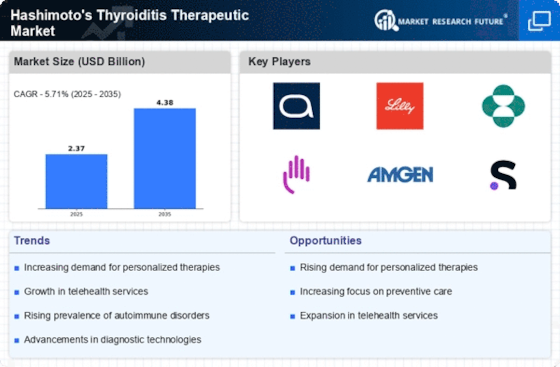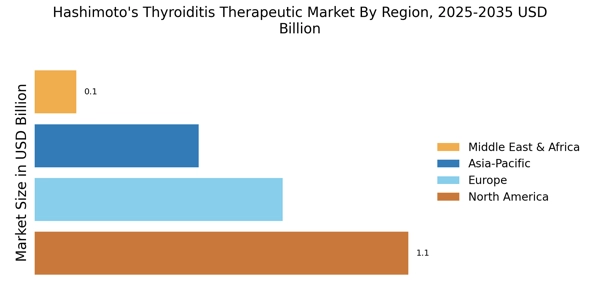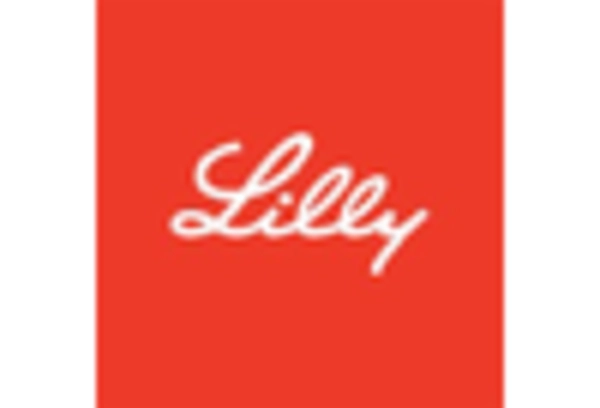Advancements in Diagnostic Technologies
Technological advancements in diagnostic methodologies are transforming the Hashimoto's Thyroiditis Therapeutic Market. Enhanced testing techniques, such as high-sensitivity thyroid-stimulating hormone (TSH) assays and antibody testing, facilitate earlier and more accurate diagnosis of Hashimoto's. This early detection is crucial, as it allows for timely intervention and management, which can significantly improve patient outcomes. The market for diagnostic tools is projected to grow, driven by the increasing demand for precise and efficient testing solutions. Furthermore, the integration of telemedicine and digital health platforms is likely to enhance patient access to diagnostic services, thereby increasing the number of diagnosed cases. As a result, the Hashimoto's Thyroiditis Therapeutic Market may experience a surge in demand for therapeutic options tailored to newly diagnosed patients.
Rising Demand for Personalized Medicine
The trend towards personalized medicine is gaining traction within the Hashimoto's Thyroiditis Therapeutic Market. Patients increasingly seek treatments tailored to their unique genetic and biochemical profiles, which can lead to improved therapeutic outcomes. This shift is prompting pharmaceutical companies to invest in the development of targeted therapies that consider individual patient characteristics. The market for personalized medicine is expected to grow significantly, with projections indicating a compound annual growth rate of over 10% in the coming years. As healthcare providers adopt more individualized treatment approaches, the Hashimoto's Thyroiditis Therapeutic Market may witness a transformation in how therapies are developed and administered, ultimately enhancing patient satisfaction and adherence.
Increasing Prevalence of Autoimmune Disorders
The rising incidence of autoimmune disorders, including Hashimoto's Thyroiditis, appears to be a pivotal driver for the Hashimoto's Thyroiditis Therapeutic Market. Recent estimates suggest that autoimmune diseases affect approximately 5-8% of the population, with Hashimoto's being one of the most prevalent. This increasing prevalence necessitates a corresponding rise in therapeutic interventions, thereby expanding the market. As awareness grows regarding the symptoms and implications of Hashimoto's, more individuals seek diagnosis and treatment, further propelling market growth. The demand for effective therapies, including hormone replacement and immunomodulatory treatments, is likely to increase as healthcare providers recognize the need for comprehensive management of this condition. Consequently, the Hashimoto's Thyroiditis Therapeutic Market is poised for significant expansion in response to these trends.
Growing Investment in Research and Development
Investment in research and development (R&D) within the pharmaceutical sector is a critical driver for the Hashimoto's Thyroiditis Therapeutic Market. Pharmaceutical companies are increasingly focusing on developing novel therapies that target the underlying mechanisms of Hashimoto's, rather than merely addressing symptoms. This shift towards innovative treatment modalities, including biologics and personalized medicine, is expected to enhance therapeutic efficacy and patient adherence. The global market for thyroid medications is projected to reach USD 2.5 billion by 2026, indicating a robust interest in this therapeutic area. As R&D efforts intensify, the Hashimoto's Thyroiditis Therapeutic Market is likely to benefit from the introduction of new and effective treatment options, catering to the diverse needs of patients.
Increased Focus on Patient Education and Support
The emphasis on patient education and support is becoming increasingly relevant in the Hashimoto's Thyroiditis Therapeutic Market. Healthcare providers are recognizing the importance of equipping patients with knowledge about their condition, treatment options, and lifestyle modifications. This focus on education is likely to empower patients, leading to better management of their symptoms and improved quality of life. Support groups and online resources are proliferating, providing patients with platforms to share experiences and strategies for coping with Hashimoto's. As patient engagement rises, the demand for effective therapeutic solutions may also increase, driving growth in the Hashimoto's Thyroiditis Therapeutic Market. Enhanced patient understanding can lead to more proactive healthcare decisions, ultimately benefiting both patients and the market.

















